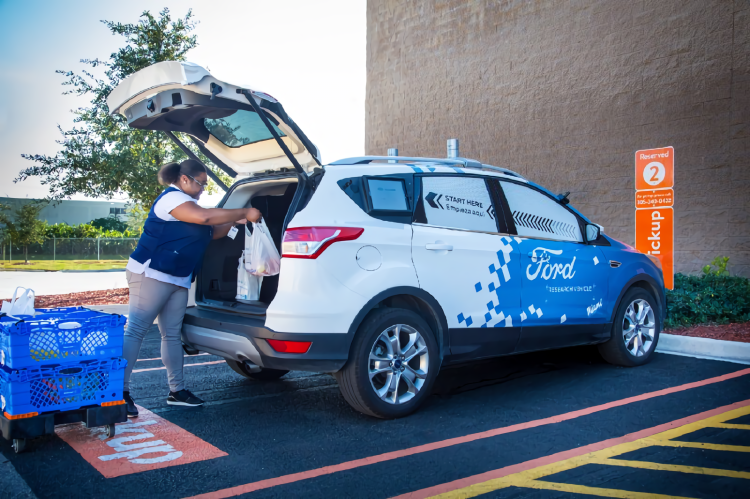Watch all the Transform 2020 sessions on-demand here.
Mere months after Ford announced it would collaborate with Agility Robotics to explore a range of autonomous home package delivery concepts, the automaker revealed that it’s acquiring a company whose bread and butter is self-guided machines, modeling, and simulation.
Ford purchased Quantum Signal — the 20-year-old company behind computer-generated environments (ANVEL) used by militaries to test unmanned remote and autonomous systems — for an undisclosed amount. The carmaker says it will make use of Saline, Michigan-based Quantum’s “extensive experience” in real-time simulation to build out its transportation-as-a-service (TaaS) platform, as well as controls that support functional safety and other vehicle technologies.
Ford chief technical officer Randy Visintainer expects that Quantum’s wide-ranging software development and hardware prototyping portfolio — as well as its work in sensing and perception — will broadly support Ford’s ongoing effort to develop self-driving vehicles.
“While Quantum Signal has operated in relative obscurity over the past couple of decades, its work has been on our radar at Ford for a while now,” wrote Visintainer in a blog post. “With the company’s expertise, we can develop even more comprehensive simulation environments at Ford in which we can test our vehicles and our business model in order to achieve further performance improvements.”
June 5th: The AI Audit in NYC
Join us next week in NYC to engage with top executive leaders, delving into strategies for auditing AI models to ensure fairness, optimal performance, and ethical compliance across diverse organizations. Secure your attendance for this exclusive invite-only event.
Quantum Signal, which was cofounded by COO Mitchell Rhode and chief scientist William Williams in 2000, helped commercialize algorithms developed during Williams’ University of Michigan tenure. Prior to the purchase, the company chiefly made robotics navigation software and simulator systems for the U.S. Army (including at the Tank-Automotive Research, Development, and Engineering Center in Warren, Michigan), as well as defense prime contractors, commercial gaming companies, and automotive customers like Ford.
Separately, Quantum Zero’s video gaming subsidiary — Reactor Zero — developed digital stress tests for ground vehicles and robots and contributed its software development expertise to games like Red Faction: Guerilla. As of 2010, about 60% or more of Quantum Signal’s revenue was in military contracts, while 80% of Reactor Zero’s work was in U.S. Department of Defense contracts for military simulations and 5% was in automotive.
As recently as April, Ford said it planned to deploy upwards of 100 autonomous cars by the end of 2019, and Visintainer asserted that Quantum Signal will help it achieve this and future milestones.
“Quantum Signal will play a crucial role in advancing Ford’s self-driving vehicle development, while also representing the company’s commitment to nurturing the talent needed to successfully deploy this technology,” he said. “[Its work] can be repurposed to support Ford’s self-driving vehicles to help improve their ability to analyze the environment around them.”
Ford has a close relationship with Pittsburgh-based driverless technologies startup Argo AI, which it pledged to invest $1 billion in over the next five years. Argo is currently testing autonomous cars in Miami and Detroit, with plans to expand tests to Washington, D.C. in the coming months, and it has obtained a permit to put its self-driving cars on California roads.
In November, Ford unveiled a collaboration with Postmates to deliver food, personal care items, and other everyday goods from Walmart stores in Miami-Dade County. This came months after Ford launched a delivery program — albeit a non-autonomous one — with Postmates in Miami and Miami Beach, Florida. The latter pilot lets customers order goods from local businesses. Orders are delivered via Ford Transit Connect cars sporting multiple storage lockers, speakers, and touchscreens.
As part of a $900 million investment in its Michigan manufacturing footprint that was announced two years ago, the automaker said in March it would build a new factory dedicated to the production of autonomous vehicles. In July, Ford revealed it would create a separate $4 billion Detroit-based unit to house the research, engineering, systems integration, business strategy, and development operations for its self-driving vehicle fleet.


